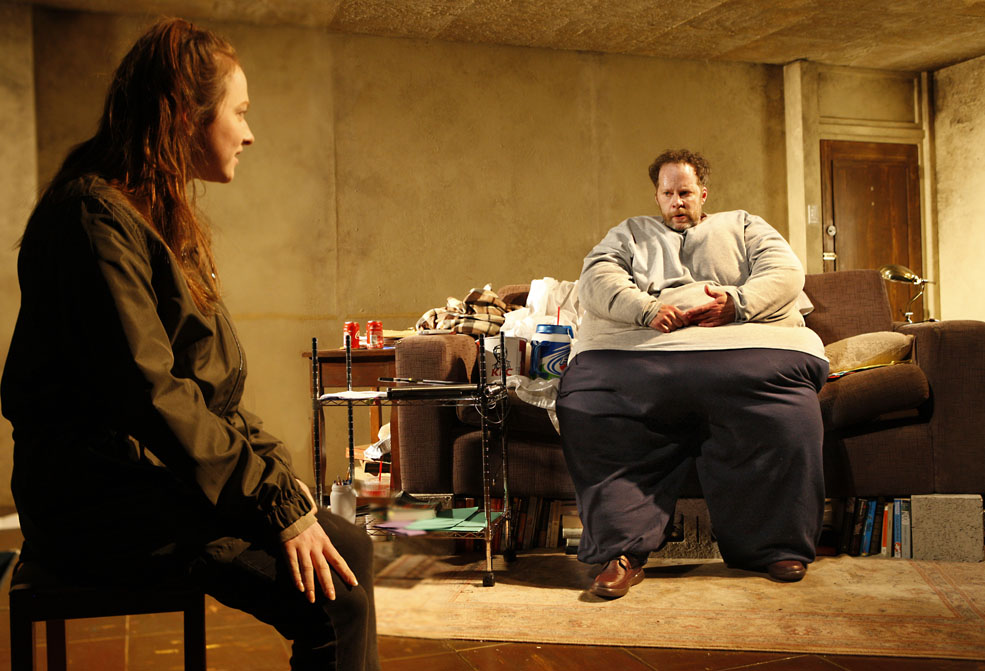 Over the last few years there has been a sense of optimistic anticipation connected with visits to the Ustinov. Under Laurence Boswell, who directs the present play, the mix of neglected classics and modern theatrical gems from around the world has given us writing and acting of the highest quality in the comfortable and intimate premises tucked away at the back of the Theatre Royal. The present award-winning play by American playwright, Samuel D. Hunter, does not let the ball drop.
Over the last few years there has been a sense of optimistic anticipation connected with visits to the Ustinov. Under Laurence Boswell, who directs the present play, the mix of neglected classics and modern theatrical gems from around the world has given us writing and acting of the highest quality in the comfortable and intimate premises tucked away at the back of the Theatre Royal. The present award-winning play by American playwright, Samuel D. Hunter, does not let the ball drop.
Charlie is an online English tutor, living alone in a small Idaho town. Charlie is morbidly obese almost to the point of caricature. We are directed (we might say led by the nose) to the meaning of the metaphor that sits at the heart of the piece by a short essay about Moby Dick. It is suggested, accurately or not – that is beside the point – that the story’s metaphor is one of displacement, that is to say, the quest for revenge on the leg-eating mammal is a diversion from other problems. So by extension, Charlie’s weight problem is a death-wish resulting from the protracted wasting away of his lover. There is thus a rather neat asymmetry between Charlie’s death by excess on the one hand and his lover’s death by an emaciating neglect.
The play is in one sense about another play, unwritten and perhaps just as, if not more interesting, about the relationship between a married man and an engaged Mormon, himself the son of a Mormon Bishop, who found they could not live without each other. Anyway, unable or unwilling to seek proper medical intervention, Charlie attempts to tidy up the one major regret of his life before he dies, namely his guilt over deserting his wife and infant daughter. There are several oblique digs at Mormonism, which comes out as having had a damaging effect on the lives of the people it has touched.
It is undoubtedly a strength of the writing that all the characters are well drawn enough to leave us wanting more. What we have in addition to Charlie’s story are four exquisite thumbnail sketches. His daughter, Ellie, is a belligerent, misanthropic teenager. Confrontational, sullen and bright, Rosie Sheehy’s creation is emotionally taut with a whip-like intelligence that is continually poised to excoriate vulnerabilities in others.
The young, gauche Mormon, Elder Thomas, who comes a-calling on his missionary work and finds himself drawn into Charlie’s end-of-life ruminations is given sympathetic and humanizing treatment by Oscar Batterham. Avoiding all the clichés of the somewhat waxworks-like stereotype of the neatly combed door-to-door evangelists, Mr Batterham finds a young man innocently trying to do the best for others according to his lights.
Shuler Hensley as Charlie, gives us homo-gargantua with great sensitivity and pathos which never becomes maudlin. The clarity of his emotional journey together with the sheer technical triumph of portraying such a character without making him grotesque make this a performance of some stature.
Mr Boswell is generous in his attention to all the characters, no less than Mary (Teresa Banham) Charlie’s wife and Liz, his nurse (Ruth Gemmell). Both these actresses have the ability to suggest their characters’ life beyond the stage, which then informs the dialogue with delicate resonance, and it is one of Mr. Boswell’s strengths that such subtleties and nuances are given full play during performance.
The set by designer, Tim Shortall, is surrounded by a sea of used plastic bottles, suggesting perhaps the destructive isolation in which Charlie has put himself. The back projections of the sea sound a plangent note again reminding us that a metaphor is stalking the action, but again the director only allows as much as is necessary to his purpose.
This is another of those plays we can put on the shelf marked ‘Ustinov Wonders’ and will, if the central performance has anything to do with it, enjoy as much success on this side of the pond a the other. ★★★★★ Graham Wyles 1st May 2018
Production photo by Simon Annand

